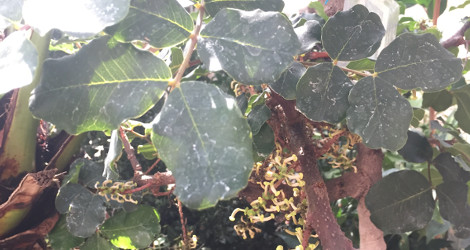Accession Data:
Ceratonia siliqua L.
- Common Name: Carob, St. John's Bread
- Family: Fabaceae Juss.
- Description: Dioecious. This accession includes male and female trees.
Legend says St. John ate the pods, thus the second common name.
Many plants have a rich history of use throughout time, but few can probably out boast the humble carob tree. It is said that the sweet pulpy fruit pods of the tree were the "locusts" that St. John survived on in the wilderness and thus the name associated with it.
In 1811 and 1812, these pods were the principle food of the British Cavalry during the war and they have been much used for cattle fodder. At one time, the seeds were in high demand by chemists, as singers thought that they cleared the throat. The seeds were even once used by jewelers as the original carat weight. Even medicinal uses have been found for the pods, with laxative and demulcent qualities being associated with them.
The pods are rich in protein and sugar and have often been proclaimed "wholesome for man or beast". The pulp is a valuable sweetener and chocolate substitute and the seeds have even been roasted as a coffee substitute. The seeds and pods can be fermented and distilled, with the drink retaining the appealing flavor of the pods. The seeds ground up produce a protein rich flour that contains no starch or sugar and is ideal for diabetics. A mature tree can produce over 400 pounds of pods and seeds annually.
The tree itself is a native of the East Mediterranean area. It grows to 30 ft. with attractive, shiny green leaves and dark red flowers. It grows very well in dry areas and produces a beautiful wood with a pinkish hue. Young plants are excellent tub specimens for the greenhouse and mature plants are hardy to about 18 degrees. Seeds can be germinated by nicking the hard outer coating and soaking in warm water until swollen, or using a hot water treatment. Plant 1" deep in loose, well drained soil and they will normally germinate in about 3-4 weeks.
Accession Data:
- Accession # 202400060
- Source: seed from Lebanon
- Provenance:
Seeds collected in Lebanon in 2020, sown after hot water treatment April 2021. Two male and one female plant at the time of accessioning.
- Accession Date: 07-16-2024
- Bench: 6901 - Array 1, Tank 1
- Currently: active - healthy
- Qty: 3 confirmed on 07-16-2024
- Restrictions:
Classification:
- Division: Magnoliophyta
- Class: Magnoliopsida
- SubClass: eurosid I
- Order: Fabales
- SubOrder:
- Family: Fabaceae
- SubFamily: Caesalpinioideae
- Tribe: Cassieae
- SubTribe: Ceratoniinae
References (internal):
- EEB Greenhouse Holdings native to: France / Spain / Albania / Greece / Italy / Yugoslavia / Algeria / Libya / Morocco / Tunisia / Canary Is. / Cyprus / Iran / Lebanon-Syria / Palestine / Turkey
References (external):
- Plants For A Future Last accessed on Tuesday, October 31, 2017.
- California Rare Fruit Growers WWW Site
- SBE Seed January '97 email Newsletter
- The Plant List (2013). Version 1.1. Last accessed on Tuesday, October 31, 2017.
- Ceratonia siliqua at ARS-GRIN. Last accessed on Tuesday, October 31, 2017.
- Ceratonia siliqua at Wikipedia. Last accessed July 16, 2024.
data regenerated on Thu, 03 Jul 2025 13:57:27 -0400 [bcm v4.0]
Images:

Additional images for this accession:
Click on thumbnails to enlargeCurrent Accessions in the Fabaceae
Subfamily Caesalpinioideae
Subfamily Caesalpinioideae
Tribe Cassieae
- Cassiinae: Cassia fistula

- Cassiinae: Senna corymbosa


- Ceratoniinae: Ceratonia oreothauma W/C

- Ceratoniinae: Ceratonia siliqua


- Ceratoniinae: Ceratonia siliqua


Subfamily Caesalpinioideae
Tribe Detarieae
Subfamily Faboideae
Tribe Amorpheae
Subfamily Faboideae
Tribe Desmodieae
- Desmodiinae: Codariocalyx motorius


Subfamily Faboideae
Tribe Genisteae
Subfamily Faboideae
Tribe Millettieae
Subfamily Faboideae
Tribe Phaseoleae
- Cajaninae: Rhynchosia phaseoloides


- Clitoriinae: Clitoria ternatea

- Erythrininae: Apios americana

- Erythrininae: Erythrina crista-galli

- Erythrininae: Erythrina sandwicensis W/C


Subfamily Faboideae
Tribe Sophoreae
Subfamily Mimosoideae
Tribe Acacieae
- Acacia angustissima


- Acacia arabica
- Acacia brachybotrya

- Acacia longifolia subsp. sophorae

- Acacia saligna


- Vachellia cornigera


- Vachellia farnesiana


- Vachellia hindsii


Subfamily Mimosoideae
Tribe Ingeae
Subfamily Mimosoideae
Tribe Mimoseae
W/C = Wild Collected
 = indicates flowering in past 14 days
= indicates flowering in past 14 days
 = images available for this accession
= images available for this accession
 = map available for this accession
= map available for this accession
 = accession added within past 90 days
= accession added within past 90 days

